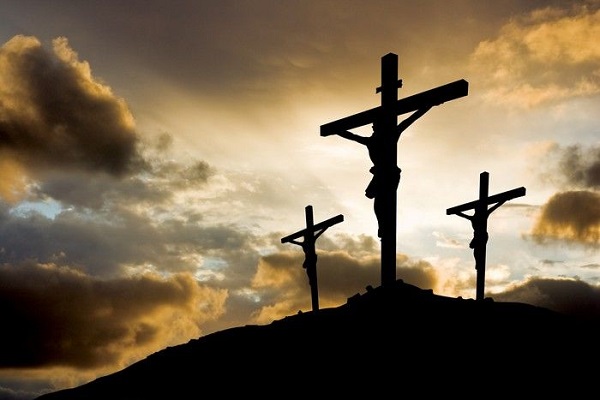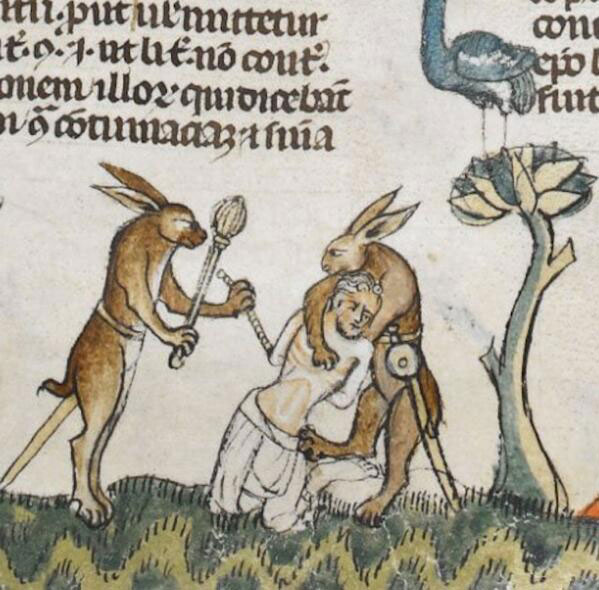
Jesus on Nazareth was not just the son of a carpenter, or a great spiritual teacher. When we went to church in Erlangen with my friend in 2015, the young pastor on training wheels challenged us as to whether we believed in the risen Christ. She said that if we did we were obligated to look at why the son of God became human, died for us, but then conquered death, returning to the Father, but with us all the time if we accept Him.
This is what Easter is supposed to be about. Beyond that the Easter festival signalled spring and rebirth, which is the symbolism of the egg.
When I was growing up in a Lutheran community in the Australian bush we had coloured hens eggs, but no-one talked about rabbits. However, a teacher at our little Lutheran Day School soon after WW2 brought the Easter bunny to the district. Easter has never been the same.
In this account the floppy-eared bearer of candy came to America with German immigrants:
- According to some sources, the Easter bunny first arrived in America in the 1700s with German immigrants who settled in Pennsylvania and transported their tradition of an egg-laying hare called “Osterhase” or “Oschter Haws.” Their children made nests in which this creature could lay its colored eggs. Eventually, the custom spread across the U.S. and the fabled rabbit’s Easter morning deliveries expanded to include chocolate and other types of candy and gifts, while decorated baskets replaced nests. Additionally, children often left out carrots for the bunny in case he got hungry from all his hopping.
We are also told:
- Bunnies aren’t the animal traditionally associated with Easter in every country. Some identify the holiday with other types of animals like foxes or cuckoo birds.
And in olden times they were not always friendly, in fact they tried to kill you:

Here in Oz Easter has mostly become the pursuit of pleasure and company (barbies, parties and such), along with vast amounts of chocolate bunnies and eggs:

As is the capitalist way. However, peaceful hedonism beats fear of mortal peril.
This year all has changed again, but not necessarily the meaning. My friend in Erlangen sent me this image:

The virus Covid 19 has reinstated peril, has emptied the churches, but the message is still the same.
This caused some difficulty for the Christian Scott Stevens, and the Muslim Waleed Aly on ABC RN’s The Minefield. How could a benificent all-powerful God allow all this to happen?
Together with David Newheiser, Research Fellow in philosophy and the study of religion at the Institute for Religion and Critical Inquiry at the Australian Catholic University, they ask How can we live with coronavirus uncertainty?
- The coronavirus pandemic has exploded, in little more than a month, the illusions of certainty, confidence, optimism and control on which so much of modern life, the economy and politics are predicated. That sense of certainty, it could be argued, is based on what could be called a form of secular “Providence” — just think, here, of Adam Smith’s confidence in the “Invisible Hand” by which self-interested market relations conspire to achieve a benefit for all.
This certainty has emboldened so many of us not to own our vulnerability, our ‘exposure’ to finitude, suffering, scarcity — and thus to be governed more by efficiency and profitability in times of prosperity, rather than to build vulnerability (and therefore capacity) into our politics and social life. (There are plenty of points of connection here with climate change, incidentally.)
Living with vulnerability, embracing radical interdependence and uncertainty, therefore seems a kind of theological-political task. And it’s going to require a kind of theological-political argument against both the idolatry of “states of emergency” that accompany such crises (and the victims those emergencies invariably produce) and the bad-faith optimism that sacrifices people and planet to efficiency and prosperity.
A lot of words were spoken in 38 minutes and 19 seconds.
Newheiser finds hope, albeit with struggle and uncertainty. Progress is not baked into the human story.
My thought is that there is a loss of control and the notion that we as a species are in an existential struggle should not be a surprise.
The basic problem here is that there is another pandemic here which threatens life on Earth. It’s called Homo [not so] sapiens.
Hubris may have landed us where we are, but as a species we do have to take control, of ourselves as well as the virus, in order to find a balance that preserves and enhances the natural world. Climate change may have been pushed off the front pages, but the challenge remains.
James Temple finds The unholy alliance of covid-19, nationalism, and climate change.
In mid December climate talks in Madrid failed:
- by most accounts, Australia, Brazil, and the US — each now run by nationalist leaders who rose to power in part on promises to defy global demands for greater climate action—took special pains to thwart progress.
Then:
- Two weeks later, researchers in China identified a deadly new coronavirus strain that had infected dozens of people, marking the start of the global pandemic. Borders slammed shut. Global trade stalled and markets crashed. Countries traded accusations and insults. In a matter of weeks, any lingering momentum behind efforts to jointly confront climate change essentially vanished.
From Madrid eyes turned to the next chance of talks in Glasgow scheduled for December 2020.
All UN climate meetings have been cancelled. Worse still, Temple says China before the pandemic seemed to be souring on climate co-operation, and seems to be re-emphasising a reliance on coal – its own coal.
Somehow we need to fashion a narrative of hope. We need to turn crisis into opportunity.
Last year at this time I posted Is religion good or bad for us? and Where is heaven? Myuch has happened and the world has changed. It seems longer than a year ago.

This was the first item of the new Salon, but got out of control, so I ran with it.
Well Happy Easter to us all, and thanks Brian for a nicely grounding piece.
Boris addressed his Country this morning, and for a while seemed very Prime Ministerial. Stark contrast to Trump, who now is arguably the most dangerous man on earth. In Oz, if you believe the statistics, our numbers are headed in the right direction, but I still can’t warm to Morrison as some sort of saviour. Perhaps unlike Trump, he did not get in the way of science.
But back to Easter, and Xmas and Believing. Late primary school I was going to Sunday school. One day someone gave me a little flag and on the back were a few words but I clearly recall reading “I fear God” Now what is that about, it was supposed to be about kindness and living well so why would I fear God? Many years later I identified that moment as when my Faith began to erode. Slowly, because at some stage I was confirmed at a nice church in Parramatta. The preparatory classes were supposed to get us ready for the Commitment to the Faith. But my cynicism had already taken root. The minister, amongst all his advice included “when the Archbishop has confirmed you, you are to arise – but you must not look anyone in the eye, having been so close to God…” I was 14 and my religious belief slipped quickly from then on. I resented that my prayers went unanswered, or that so much misery and pestilence was allowed under His watch.
It can’t surprise any reader of my experience that I have no expectation that recovery is going to come with offices of religion. Not a chance.
It is definitely a moment of opportunity on a grand scale: as Machiavelli stated ” “Never waste the opportunity offered by a good crisis.” He was cited by others ,including Churchill and I’m sure the Americans are right onto it. In Australia we do have the chance to address many things – re-instating a manufacturing industry and addressing the inequitable distribution of wealth. Difficult goals, but need to deal with both, and now is a great time.
From the Starnberg Lake in Bavaria a an Easter greeting with J.S. Bach
Not about Easter….
“Beethoven can write music, thank God, but he can do thing else on earth.”
– Ludwig van Beethoven
Some people are just soooo limited, eh?
nothing else on earth
Thanks, Ambi and Geoff.
My first religious experience of note was when I had just started school in a one-teacher Lutheran Day School at a district called Downfall Creek, near Guluguba, north of Miles west of Toowoomba.
I was the youngest kid in the school. Some of the big boys were mucking up somewhat, and the teacher told the parson. He delivered a hell and damnation sermon on the next Sunday, saying we would all go to hell if we didn’t behave.
I was probably the goodest boy in the school, but I think I was the only one that took any notice. It scared the bejesus out of me.
I can’t remember when the real doubt started, but it was their in spades as e teenager. At university I remember people telling me I had to make a leap of faith. That just didn’t work for me, I needed to know where I was leaping and why.
One Sunday evening a friend and I went to the congregation pastor’s place and told him we were out. As we drove away in my mate’s car, my mate said, “I bet he’s praying for us now”.
In general terms I’m agnostic, which is over-simplistic, but it will do for now. I speak only for myself and as I am in the present. I respect some believers more than others, but try to be generally respectful of others’ beliefs.
I’m right there with you, Brian.
I tried to get involved with religion, but it failed the logic test. However in my first job out of High School I worked with a man who was part of a group called the Christian Assembly, and he had the clearest understanding of all I have ever met. His group understood that Jesus was the rebirth of (I’m stuck here because I don’t know what the religion of the Jews was called only that it is bible) “….” religion, washing away the idolatry and history worship of the Old Testament, and initiated the Church which was the coming together of people (nothing to do with buildings). Jesus internalised judgement so people would judge themselves against the Commandments and compassion as discussed in the memory of his “teachings”. ie Jesus was a thinker and a genius philosopher who created the platform for civilised community summarised as Christianity.
Jesus truly was the greatest of all moral leaders (for our culture at least). So naturally Establishment had to encapsulate and take back control of Christianity, and the lives of those who believed. The rest is history, in all of its ghastly horror. If Jesus had an understanding of Psychopathy and that people with zero empathy did not have the capacity for self reflection or concern for others then this may have been the purpose of his self sacrifice (at the hands of such a person), and his defeating death is the message that life goes on despite those people. But what a terrible human toll they have caused exemplified in Vlad the Impaler and the many religious zealots over time.
So to your final question, “is religion good for us?”,…self applied Religious aspiration is generally good, but applied religion when imposed by others is not (revisit Pastor Jim Jones’ Peoples Temple Jonestown for context).
In my Economic Power Factor Analyser I identify Religious Zeal as being a net brake on economic performance.
Pretty much spot on, BilB, I think.
Probably went wrong when Emperor Constantine issued the Edict of Milan, which accepted Christianity in 313 AD then became the official religion of the Roman Empire 10 years later.
Watching (part of) the canonization of Mary MacKillop I realised the Catholic Church is the last vestige of the Roman Empire.
zoot, that sounds about right too.
BilB, I used to know a lot more about that early history, but I think the critical event was Jehovah or Yahweh revealing himself to Abraham.
Then there was Jacob and Leah and the twelve Israelite tribes. Judah was the fourth son. His tribe came to dominate. As far as I can make out Judaism became a thing after Jesus to identify what the Jews believed, as distinguished from all others.
Jesus was identified by some as the Messiah predicted in the Davidic line, but it seems the Jews mainly did not buy the story.
There is a big thing about 1,000 AD because it was widely believed that would bring the Second Coming. By that time there was tension between the Holy Roman Emperor (of the German Nation) which emerged from Charlemagne, or Charles the Great (died 814). His antecedents go back to the Franks taking over the Gauls, and then we are back to the emanation of Germanic tribes, who were seen as ‘barbarians’ or’ the others’ by the Romans, but served in the legions and disrupted continental Europe from about the time of Christ.
The EU was meant to bring peace to end 2000 years of fighting.
I’d better stop there, because I’m not actually a historian, but a big issue now is that our history has been Eurocentric. That is very much under challenge right now.
My wife decided to ignore her atheist father and become a life long dedicated Christian when she was 14. At about the same time her politics moved to the far right and she started supporting Labor.
By contrast I rebelled against my Christian background at about the same age, got interested in Asian religions and then decided that people like me had to work out their own relationship with the mysteries of life and morality. Over time my politics drifted from my primary school support of the country party to becoming a true conservative who supports the Greens party.
In terms Judaism/Christianity morality there seems to be a long term conflict between the sort of thinking that saw original sin as “the knowledge of good and evil” and morality being about very general statements such as “I give you one commandment, love one another” vs the Pharisees and their nit picking rules and the harassment of those who don’t support those rules.
It seems a stretch to announce Christianity as the official State teligion, when the New Testament story has Jesus* saying
Render unto Caesar that which is Caesar’s.
Render unto God that which is God’s
As clear a statement of the separation of civil society and (personal, private, exempt from State scrutiny) religious or spiritual belief, as you are likely to find.
* as I recall, some scallywags were trying to force Jesus to speak against the occupying Roman colonial power. In modern terms, trying to “wedge” him.
No luck, scallywags.
Jesus also said:
Again I tell you, it is easier for a camel to go through the eye of a needle than for someone who is rich to enter the kingdom of God.”
Also:
Blessed are the meek: for they shall inherit the earth.
For the past two millennia the Church has studiously ignored most of what Jesus said.
Zoot: misrepresented, corrupted…
and yet, zoot… as soon as the New Testament was printed in non-Latin or Greek, a few centuries the words were available for believers and non-believers alike to read; unmediated by priests or Church officials.
a few centuries ago…
Yes Ambi, and far too many believers still ignore the difficult parts of the message.
Australia has had only one PM in recent times who didn’t claim to be a follower of Jesus and yet Australia’s treatment of refugees for the past twenty years has been the exact opposite of the Good Samaritan. Our voters respond overwhelmingly in favour of harsher penalties for rule breakers when the message of the Nazarene was turn the other cheek. And then there are his Marxist instructions to share our material goods with others – met with cries of “It’ll wreck the economy” from far too many true believers, particularly in the Catholic Boys Daily.
These are just some of the reasons I am an atheist.
It is a difficult message, zoot.
I recall a schoolteacher who said, “Christianity? No one’s ever tried it.”
I’d say “communitarian” rather than Marxist, for Jesus’s social attitudes. Sharing, helping those in need or distress, etc.
[Not much sign of “class struggle” and “dictatorship of the proletariat”?]
Could it be, that “eye of the needle” quote; could it be that he thought no-one should die wealthy? (Since it meant they’d done insufficient sharing….)
I stand corrected, the Jewish sect Jesus led was definitely communitarian. Henceforth I shall eschew the dreaded M word.
Then there was his direction to the young man (in Luke?) to give away his possessions if he wished to be a follower, and his homily on the lilies of the field. Obviously a non material philosophy (following Diogenes perhaps?)
Remind me, how much was spent refurbishing Cardinal Pell’s humble Roman abode?
Matthew 6: 28
And why take ye thought for raiment?
Consider the lilies of the field, how they grow;
they toil not, neither do they spin:
King James edition
raiment – clothing
spin – make thread
The Rev Google informs me the story of the rich young man appears in Matthew 19:16-30, Mark 10:17-31 and Luke 18:18-30. The fact that it appears in three gospels means there’s a good chance it actually happened.
Zoot: “Australia has had only one PM in recent times who didn’t claim to be a follower of Jesus and yet Australia’s treatment of refugees for the past twenty years has been the exact opposite of the Good Samaritan. ” Not sure how the good Samaritan story is relevant here.
However, it is worth remembering that Jesus and his family had to seek refugee in Egypt to escape Herod’s killing of young boys of Jesus’s age.
Jesus was lucky that the likes of Abbot, Howard, etc. were not in control of Egypt’s refugee policy.
I think the imperative to assist those in need is relevant.
The harsh criticism of the Pharisees – not so much.
Or you can try Matthew 25 (you’ll recognise the bit)
Himself was quite definitely not in favour of Australia’s border policy.
Zoot: “Not sure how the good Samaritan story is relevant here.” I said this in the context of refugee policy, not the general issue of helping others. In its context the story was about member of the a despised Samaritan group doing the right thing by helping a stranger.
John it is how we regard the ‘other’. I’ve just found a guest post I did a Quiggin’s in 2004. I might republish it.
Meanwhile check out how Singapore treats what must be regarded as indented Labor in near slave conditions:
The Missing Link in Singapore’s COVID-19 Strategy
Indentured labour is one of the hidden scandals of modern times. Has it been exacerbated by the rapid rise in global trade?
All of us have heard of sweatshops. That term and that practice goes back a very long way. It didn’t require neoliberal policies or “globalisation”, to flourish. But sweatshops have modernised and some are gigantic.
{Just as well there are strong, independent trade unions making big efforts to stamp out “near slavery” in the PRC, and in many Third World nations!!!
/sarc.}
“ Begin at the beginning,
the King said, very gravely,
and go on until you come
to the end: then stop.”
– Lewis Carroll (Alice in Wonderland)
printed on the card for attendees at a funeral, a few years ago
nearly two thousand years after one man had been nailed to a tree for saying how great it would be to be nice to people for a change…..
– Douglas Adams,
author of “Hitchhikers Guide to the Galaxy”
“The Moving Finger writes; and, having writ, Moves on: nor all thy Piety nor Wit. Shall lure it back to cancel half a Line, Nor all thy Tears wash out a Word of it.” ― Omar Khayyam, Rubáiyát of Omar Khayyám . My favourite.
Supposedly… expresses the notion that whatever one does in one’s life is one’s own responsibility and cannot be changed.
Politicians and Church people should heed.
Omar K seems to think regret is a wasted emotion…
(or have I misunderstood?)
I don’t think so Ambi, I’ve always thought that context would be critical. I first heard it watching the original “Pandora and the Flying Dutchman” and it stuck. Years later it turned out my father had a copy of the Rubáiyát , a small leather-bound volume that has succumbed to the earth somewhere…
For me it is an acceptance of what has passed and no use expecting a change. There may be regret in there, but not necessarily as a wasted emotion.
I should add that Hitchhikers Guide was one of my all time favourites. There was a text-based computer game a long time ago and that’s how I came to love Adam’s preposterous humour. Have some peanuts Ambi.
Concerning the Rubáiyát of Omar Khayyám I love the rhythm of that piece, and pretty much agree with your reading, Geoff.
Life includes sorrow, which we best accept.
There still is
Disclaimer: I don’t recall ever getting as far as the pub.
Amongst the old possessions passed down from my grandfather was an old Rubaiyat bound in soft leather; unfortunately the mould got to the volume. I discarded it, after supping at its pages.
Thanks for the peanuts, Geoff.
A glass of wine in the desert, too.
+ + + + +
“He said people should be nice to each other, so they nailed him to a tree.”
For me, the key word there is so,
and I weep.
+ + + + +
Zoot a thousand thanks, conveyed by as many peanut- carrying camels.